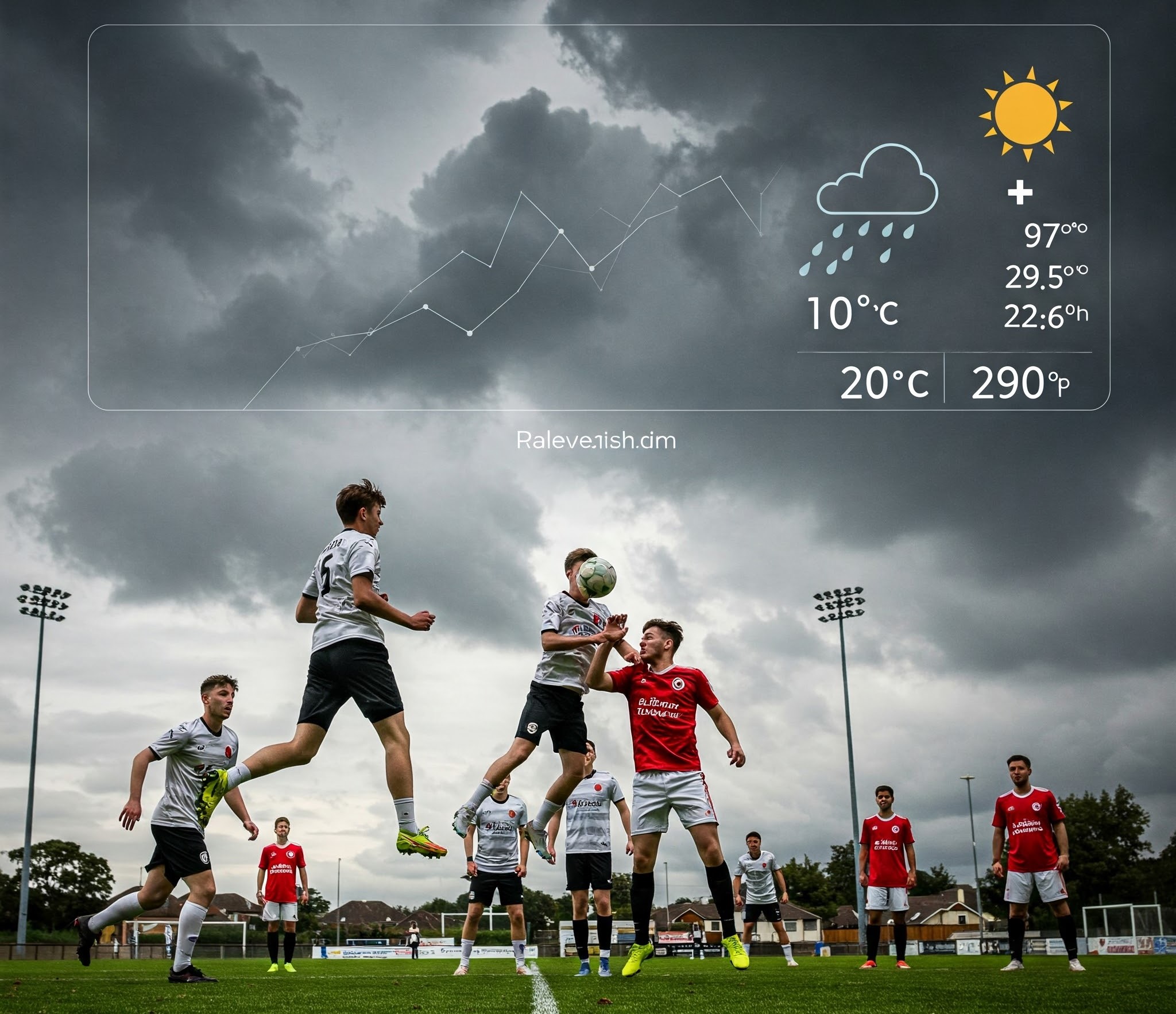Understanding the Role of Weather in Sports Predictions
NLB Staff
18.02.2025 01:56
 Understanding the Role of Weather in Sports Predictions
Understanding the Role of Weather in Sports Predictions
Weather plays an undeniable role in shaping the dynamics of sports and, by extension, influencing the outcomes of games. Whether it’s cricket, football (soccer), or basketball, understanding the nuances of weather impacts can be a game-changer for sports enthusiasts and bettors alike. Integrating weather insights into betting strategies can significantly enhance decision-making accuracy, enabling bettors to craft predictions that align with on-ground realities.
This article delves deep into the role of weather in sports predictions, focusing on cricket, football, and basketball while offering actionable tips to elevate betting strategies.
Cricket: Weather as a Game-Changer
Cricket is a sport inherently tied to outdoor conditions, making weather one of the most influential factors in determining match outcomes. From altering the pitch's nature to affecting ball movement, weather intricacies shape every aspect of the game.
Clear Skies vs. Overcast Conditions
- Clear Skies: Under clear skies, batsmen usually dominate as the ball swings less, and the pitch remains predictable. Teams tend to post higher scores, which often shifts betting odds in favor of teams with strong batting lineups.
- Overcast Weather: Overcast conditions favor bowlers, particularly seamers, due to increased ball swing in humid air. This dynamic leads to lower scores and heightened wicket-taking opportunities, making it vital for bettors to lean toward teams with proficient seam bowlers.
Rain and Humidity
- Rain: Rainy weather disrupts play and impacts the pitch by making it damp. Damp pitches assist bowlers, especially spinners, by providing more grip and variation. However, interruptions due to rain often reduce match lengths, leading to Duckworth-Lewis calculations in limited-overs games, complicating betting predictions.
- Humidity: In high-humidity environments, bowlers experience increased movement off the pitch, making batting challenging. For instance, subcontinental venues with high humidity often see lower average scores, a crucial insight for those seeking sure win predictions.
Dew Factor
In day-night matches, dew significantly affects gameplay. While it aids batsmen by reducing the ball's swing, it hinders bowlers' grip. Betting on teams with experienced bowlers adept at handling such conditions can be advantageous.
Takeaway: Analyzing weather conditions and historical team performance under similar circumstances is essential for predicting cricket outcomes effectively.
Football: Weather's Influence on Game Dynamics
Football (soccer) is played across diverse climates and terrains, making weather a critical determinant of game performance. Bettors who incorporate weather analysis into their soccer betting tips today stand to gain an edge.
Temperature Effects
Temperature impacts player stamina and strategy.
- Cold Weather: Research suggests that cold temperatures often result in fewer goals. Reduced energy levels and stiffened muscles make it difficult for players to perform optimally, particularly for teams unaccustomed to freezing conditions.
- Hot Weather: Extreme heat, conversely, causes quicker fatigue, slowing down gameplay and reducing scoring opportunities.
Wind Speed
Wind plays a pivotal role in disrupting game flow:
- High Winds: Strong winds (over 20 mph) can impact passing accuracy and ball control. Erratic ball trajectories lead to an increase in corner kicks but fewer successful goal attempts. This dynamic provides insightful betting opportunities, such as focusing on set-piece specialists or betting on corner count totals.
Rain and Wet Grounds
Rain-soaked grounds make the ball move unpredictably and increase the chances of defensive errors. This often results in higher-scoring matches. Teams adept at playing under such conditions, particularly those with robust midfield control, often have an advantage.
Takeaway: Including weather-specific insights in soccer betting strategies can help identify undervalued teams or players poised to excel under certain conditions.
Basketball: Weather’s Indirect Effects
Although basketball is primarily played indoors, weather conditions indirectly influence game outcomes in ways often overlooked. For those interested in expert basketball betting tips, acknowledging these subtle factors can provide a strategic advantage.
Travel Conditions
Severe weather can disrupt travel schedules, leading to delays or reduced preparation time for teams. Fatigue from prolonged travel often translates to subpar performances, especially for visiting teams. Bettors should closely monitor team travel updates during adverse weather periods.
Fan Attendance and Atmosphere
Bad weather can affect fan turnout, reducing home-court advantage. A quieter crowd often diminishes the psychological boost players derive from their supporters. Analyzing attendance trends during inclement weather can provide insights into potential performance deviations.
Player Fatigue
Extreme weather outside the arena, such as snowstorms or heatwaves, may affect players’ physical and mental states. For example, players arriving late or practicing less due to weather-related disruptions may not be at their peak, a crucial consideration for basketball points predictions today.
Takeaway: While weather impacts on basketball are less direct, their cumulative effects on travel, preparation, and crowd dynamics are crucial for accurate predictions.
Integrating Weather Insights into Betting Strategies
Leveraging weather-related knowledge in betting requires a structured approach. Here are some expert tips for integrating weather considerations into your sports betting strategies:
1. Monitor Real-Time Weather Forecasts
Stay updated with accurate, localized weather forecasts leading up to game time. This is especially crucial for sports like cricket and football, where sudden weather changes can drastically alter team strategies.
2. Analyze Historical Data
Evaluate how teams have historically performed under similar weather conditions. For instance:
- In cricket, check batting averages under overcast skies versus sunny conditions.
- For soccer, consider a team’s goal-scoring record in cold versus warm climates.
- In basketball, review team performance during disrupted schedules or low-attendance games.
3. Assess Team Adaptability
Some teams thrive under adverse conditions due to better preparation or adaptability. For example:
- Teams with experienced bowlers are better equipped to handle rain-affected cricket matches.
- Soccer teams accustomed to high wind or rain perform better than those reliant on precision play.
- Basketball teams with deep rosters can mitigate fatigue from weather-related travel delays.
4. Adjust Bets Dynamically
As weather conditions evolve, adjust your bets accordingly. For instance:
- Opt for higher totals in soccer during rain-soaked games due to increased defensive lapses.
- Favor bowlers in cricket when the pitch is damp and overcast conditions prevail.
- Reduce confidence in away teams for basketball games impacted by severe travel disruptions.
Conclusion
Weather is a powerful variable influencing sports outcomes, and incorporating weather insights into betting strategies can significantly improve predictive accuracy. By understanding the interplay of weather conditions across cricket, football, and basketball, bettors can craft strategies that are both informed and effective. From analyzing humidity and cloud cover in cricket to leveraging wind speed data in football and assessing travel disruptions in basketball, weather-aware betting is a sure path to enhancing success.
For those seeking soccer betting tips today, sure win prediction insights for cricket, or expert basketball betting tips, integrating weather considerations can be the difference between ordinary predictions and exceptional ones.
Frequently Asked Questions
1. How does weather impact cricket match outcomes?
Weather affects cricket in multiple ways, such as altering ball movement in overcast conditions, making pitches damp during rain, and creating dew in day-night matches. These factors influence batting, bowling, and overall team performance, shaping match results.
2. What role does wind speed play in football (soccer) betting strategies?
High wind speeds can disrupt passing accuracy and ball control, reducing goal counts but increasing corner kicks due to erratic ball trajectories. Analyzing these conditions can help bettors focus on specific metrics like corner totals or set-piece specialists.
3. Can weather conditions outside the arena affect basketball games?
Yes, while basketball is played indoors, external weather conditions can disrupt travel schedules, cause player fatigue, and impact fan attendance. These indirect effects can influence team performance and home-court advantage.
4. Why is monitoring real-time weather forecasts important for sports betting?
Real-time weather updates help bettors adjust their predictions to account for sudden changes in conditions, such as rain in cricket, cold temperatures in football, or snowstorms affecting basketball travel schedules.
5. What are some actionable tips for integrating weather into betting strategies?
Key tips include monitoring localized weather forecasts, analyzing historical performance under similar conditions, assessing team adaptability to adverse weather, and dynamically adjusting bets based on changing weather scenarios.











 BeGambleAware.org
BeGambleAware.org